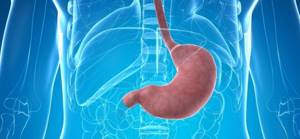Coffee on an empty stomach: is it possible or not?
The answer to the question whether it is possible or not is unequivocal - it is not prohibited, but only subject to certain rules. If this does not happen often and a high-quality drink is consumed, not a sublimate. It doesn't hurt to add some fresh cream to your cup.
After waking up, the human body releases the hormone cortisol, which is responsible for vigor and increased tone. Coffee entering the stomach every morning becomes addictive; the hormone ceases to be produced on its own. The result is that it is impossible to wake up without a cup of aromatic drink.
Even the highest quality drink contains no more than 25% of coffee itself; everything else is preservatives, flavor enhancers, emulsifiers, and chemical components that negatively affect human health.
How does caffeine affect the stomach?
The main enemy of the stomach walls is chlorogenic acids, which irritate them. The body accepts coffee as food, acidity increases, but there is no product for digestion. After a month of regular use, gastritis, ulcers, and in more rare cases, cancer may develop.
Excess caffeine increases nervousness, irritation, and anxiety. It invigorates for a while, but the effect wears off quickly. After this, the body receives a blow to the nervous, circulatory and digestive systems. In addition, it calls:
- Heartburn. This occurs due to relaxation of the lower cardinal sphincter. To prevent contents from escaping back into the esophagus, the muscle must be closed. If it is not food that first enters the stomach, but coffee, the hydrochloric acid contained in it enters the esophagus and irritates the mucous membrane.
- Ulcer. This disease is caused by the bacteria Helicobacter Pylori. The effect of coffee weakens the mucous membrane and allows them to multiply. The additives contained in the product irritate the mucous membrane of the small intestine. It is harmful for people with gastritis, Crohn's disease.
- Stimulation of peristalsis. Coffee consumed before breakfast promotes rapid emptying of the stomach, from where the product passes into the small intestine without being digested properly, which leads to gastrointestinal diseases.

The digestive system and emotional state are closely interconnected; drinking a lot of coffee on an empty stomach will negatively affect your mood and digestion of food.
Is all coffee bad for you on an empty stomach?
It is allowed to drink a brewed drink from green grains on an empty stomach; only after 15 minutes you need to have a good breakfast. Its constant use leads to weight loss, because excess calories are quickly burned, because coffee affects metabolism. But it is not recommended to make this a habit in order to lose weight, as it can have a negative impact on the body.
Effect of instant coffee
The disadvantage of drinking coffee in the morning on an empty stomach is the lack of absorption of a number of vitamins and microelements, such as magnesium, sodium and calcium. This leads to osteoporosis, especially in women. To prevent the development of the disease, replenishing the loss of microelements, you should drink a complex of vitamin-containing preparations.
Dependence is another negative factor that leads to an increase in the amount of drink consumed. But, getting rid of the habit, it is necessary to reduce its strength and volume gradually. The following groups of people are not advised to drink instant coffee:
- patients with hypertension, glaucoma;
- ischemic disease;
- people suffering from insomnia and prone to excitability.
Why can't you have a lot of coffee? Excessive consumption provokes exacerbation of gastritis, increases acidity, and affects male potency. The freeze-dried drink contains a higher percentage of caffeine than the natural product and is predominantly synthetic.
Ground natural coffee
Caffeine is considered an important constituent of coffee beans. In addition to it, it contains many other substances. The combination with lipids, soluble carbohydrates, and organic acids is beneficial. Benefits of natural ground coffee:
- increases endurance to physical activity, improves mood;
- fatty acids block the feeling of hunger, allowing you to lose weight;
- unroasted grains contain sufficient amounts of potassium and magnesium;
- the presence of microelements allows you to produce insulin, regulating blood sugar;
- a moderate amount of drink reduces mental fatigue, the risk of developing cancer, stroke; Parkinson's disease.
- slows down the aging process, because antioxidants fight free radicals.
But, abuse leads to such consequences as headaches, insomnia, and overexcitability. Increases blood pressure and general stomach acidity. Coffee bean lovers have problems with bearing a child; it causes smooth muscle contraction during pregnancy. Some people are positively affected by the properties of the product, while others are negatively affected.
Important! Even if there are no contraindications, it is recommended to limit yourself to drinking two cups of natural ground coffee per day.
Does milk mitigate the effect of coffee on the gastrointestinal tract?
Is it possible to have coffee with milk on an empty stomach? Thanks to the interaction of the product's components, the loss of calcium that occurs when drinking large amounts of coffee is compensated. Milk reduces the effects of caffeine on the nervous system, while maintaining its beneficial properties. The additive reduces the aggressiveness of the drink on the mucous membranes of the stomach and intestines. The alkaline reaction of milk reduces acidity, preventing heartburn.

Coffee with milk on an empty stomach is not too harmful for patients with gastritis. But, it still increases the secretion of digestive enzymes, so the product is not completely safe. Often this combination of products is prescribed by nutritionists during a diet, as it causes a diuretic effect. It can reduce the negative effects of dyes, which has a positive effect on the whiteness of tooth enamel.
Conclusions:
- Coffee in the morning harms the nervous and vascular systems, and especially the gastrointestinal tract.
- Drinking coffee in the morning on an empty stomach can cause vomiting, nausea, heartburn, and abdominal pain.
- When you regularly drink coffee on an empty stomach, the body stops producing the natural hormone cortisol, which helps you feel alert and active in the morning.
- If you do drink coffee in the morning, choose a natural drink without grounds (it can be strained through a filter or brewed in a coffee machine).
- You can drink green coffee on an empty stomach, but after 10 minutes it is advisable to have breakfast.
Other negative impact
Gastroenterologists believe that drinking an aromatic drink while taking mineral preparations, especially those containing calcium, is harmful. The element will be better absorbed if the interval between taking the capsules and drinking a cup of coffee is at least 2 hours.
You should also know that coffee:
- provokes salivation and increases appetite;
- dulls thirst, which negatively affects the water balance in the body;
- harms the cardiovascular system;
- destroys tooth enamel.
To take steps towards health, it is important to recognize your dependence on a bad habit.
When is the best time to drink coffee?
So, should you drink coffee or not to be healthy? In the morning you can treat yourself to a pleasant drink, but after breakfast, no earlier than 30 minutes later. According to doctors, from 9.30 to 11.30 the level of cortisol in the blood decreases - this is the right moment. At this time, it will become a source of energy, vigor, increased performance, without causing harm.

If you break down your day into a coffee schedule, it will look like this:
- between 10 – 11 o’clock;
- from 12 to 13 hours;
- from 17.00 to 18.30.
There will be no harm to the body during this period, especially if the grains are of high quality. It’s beneficial if you drink a cup of the drink slowly and eat it with a cookie.
Why you shouldn't drink coffee on an empty stomach
Many people drink coffee on an empty stomach, without thinking about the consequences. It is not a harmless drink, it has an invigorating effect, and therefore it is preferred in the morning, when it is so difficult to wake up. But you shouldn’t get carried away with it, especially on an empty stomach.
Heartburn
Your stomach contains hydrochloric acid. For the health of the entire tract, it is critical that its concentration is at the correct level: if it is less than the “norm”, the food will no longer be digested normally; there will be more - and it will begin to corrode the walls of the stomach (in the long term this is the path to an ulcer). Drinking coffee on an empty stomach only adds problems here, because it increases the concentration of hydrochloric acid. This means that if you drink a cup of your favorite drink before eating at least a sandwich, you are at great risk. Harm in this case is determined not only by the caffeine content. The digestive organs are exposed to chlorogenic acids. They create an acidic environment, which causes heartburn. In this case, the gastric mucosa is irritated and hydrochloric acid is formed in excess, and then it affects the stomach. From the above, it becomes clear that drinking coffee in the morning on an empty stomach is very harmful. Instant coffee is considered especially harmful to the stomach. Many scientists around the world have come to this conclusion.
Is it possible to replace coffee with something?
Yes, it is possible and even necessary. There are alternative methods to feel energized in the morning. I like the taste of coffee - chicory is a worthy replacement, it contains insulin, which helps the digestive system.
Green tea and dark chocolate are a powerful boost of energy. The products contain antioxidants that give vitality.
Lemon water is an excellent replacement for morning coffee; it replenishes the supply of water that is lost overnight, strengthens the immune system, and improves the condition of the skin and gastrointestinal tract.
Freshly squeezed citrus juice gives a refreshing and invigorating effect. Contains iron, vitamin C, antioxidants. But it is important that the juice is always fresh.
How long after eating can you drink coffee?
We have already found out that drinking coffee on an empty stomach is very harmful. And here a completely justified question arises: “When is it allowed to drink it, before or after meals?” It is best to drink this drink after eating, but after some time. If freshly consumed food and coffee are mixed, the primary food processing process is disrupted. This does not have the best effect on the digestive system. The optimal option is when coffee is consumed an hour after a meal. During this time, digestion is in the active stage of “work”, and the released hydrochloric acid will join this process. It is not for nothing that, according to the ancient rule, coffee was served after a meal, and it was placed on another table, which was set in a separate room. As practice has shown, this is not only a beautiful tradition, but a tribute to maintaining health.
The ideal time to drink coffee in the morning is 10-11 am. At this time, the level of melatonin in the body will decrease, and caffeine will successfully react with cortisol (the “internal clock” hormone), which will invigorate you and allow you to focus on work.
By the way, “cortisol peaks” continue in a person all day, and if you catch them with a cup of coffee (this is the time from approximately 12 to 13.30 and from 17.30 to 18.30), then you will get the maximum invigorating effect, which you are trying to catch by “bombarding” yourself with caffeine .











